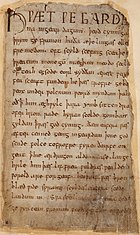Portal:Literature/Selected article archive/November 2006
 |
| Page of the poem Beowulf. |
Poetry (from the Greek "ποίησις," poesis—a "making" or "creating") is a form of art in which language is used for its aesthetic qualities in addition to, or in lieu of, its ostensible meaning.
Poetry has a long history. Early attempts to define it, such as Aristotle's Poetics, focused on the uses of speech in rhetoric, drama, song and comedy. Later attempts focused on features such as repetition and rhyme, and emphasised the aesthetics which distinguish poetry from prose.
Poetry often uses particular forms and conventions to expand the literal meaning of the words, or to invoke emotional or sensual responses. Devices such as assonance, alliteration and rhythm are sometimes used to achieve musical or incantatory effects. Poetry's use of ambiguity, symbolism, irony and other stylistic elements of poetic diction often leaves a poem open to multiple interpretations. Similarly, metaphor and simile create a resonance between otherwise disparate images—a layering of meanings, forming connections previously not perceived.
Some forms of poetry are specific to particular cultures and genres, responding to the characteristics of the language in which the poet writes. While readers accustomed to identifying poetry with Shakespeare, Dante and Goethe may think of poetry as being written in rhyming lines and regular meter, there are other traditions, such as those of Du Fu and Beowulf, which use other approaches to achieve rhythm and euphony. In today's globalized world, poets often borrow styles, techniques and forms from different cultures and languages.